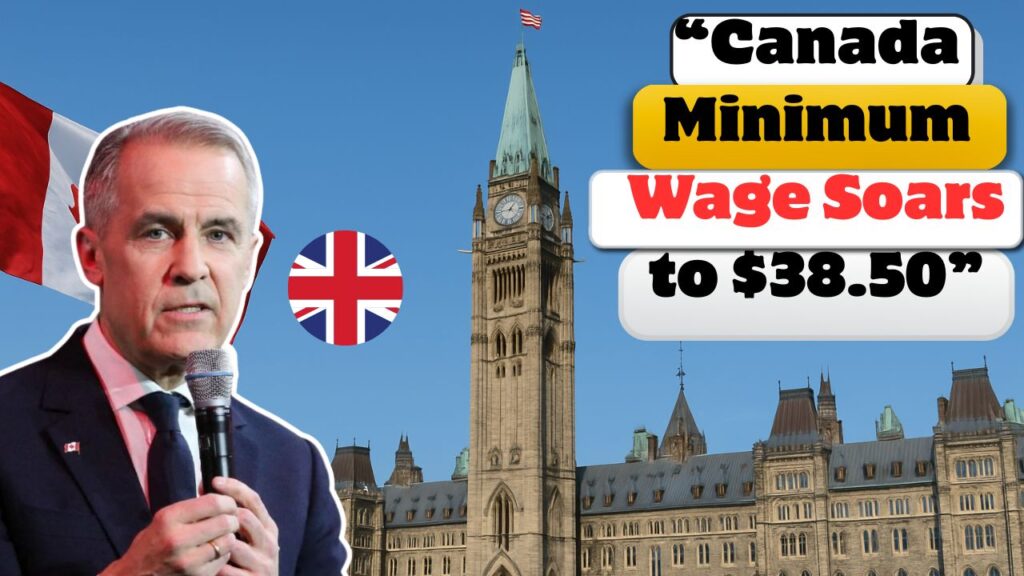Canada Minimum Wage Hike 2025 – Canada’s minimum wage is set for a historic increase in 2025, as the federal government confirms a massive jump to $38.50 per hour. This record-breaking wage hike aims to help Canadians tackle rising living costs, inflation, and housing challenges. Workers across multiple provinces have welcomed the move, calling it a long-overdue step toward fair pay. Meanwhile, many small and medium-sized employers are expressing concerns over the sudden wage escalation and its potential impact on operational costs and job stability.

Canada’s New Minimum Wage 2025: A Game-Changer for Workers
The 2025 minimum wage hike in Canada represents one of the most significant changes in recent history. By increasing the hourly rate to $38.50, the Canadian government aims to ensure that full-time workers can sustain a decent standard of living amid inflation and rising expenses. For millions of Canadian citizens, this adjustment translates into improved financial security, better work-life balance, and stronger purchasing power. Provinces like Ontario, British Columbia, and Alberta are expected to benefit most, as local workers cheer this transformative reform.
Massive Wage Increase for Canadian Employees in 2025
For Canadian employees, the 2025 wage hike is a huge relief after years of battling stagnant incomes and growing expenses. The new minimum wage of $38.50/hour is projected to reduce income inequality and bridge the gap between high and low earners across sectors. While large corporations can absorb the increased costs, smaller businesses may face challenges adjusting to the new structure. Still, this policy marks a turning point for labor rights in Canada, reinforcing the government’s commitment to fair pay and a balanced economy.
| Province | Previous Wage (2024) | New Wage (2025) | Increase (%) |
|---|---|---|---|
| Ontario | $23.50/hr | $38.50/hr | +63.8% |
| British Columbia | $22.80/hr | $38.50/hr | +68.8% |
| Alberta | $21.90/hr | $38.50/hr | +75.8% |
| Quebec | $20.50/hr | $37.00/hr | +80.5% |
| Manitoba | $20.00/hr | $36.00/hr | +80.0% |
Economic Impact of Minimum Wage Hike Across Canada
The minimum wage increase to $38.50/hr will have a profound impact on Canada’s economy in 2025. Economists predict higher consumer spending as workers have more disposable income, boosting retail and service sectors. However, there may also be inflationary pressures as businesses adjust to higher labor costs. Provinces with stronger job markets will likely adapt faster, while smaller regions may require financial assistance to maintain employment stability. Overall, the wage boost underscores Canada’s focus on social equity and long-term economic resilience.
Government Measures Supporting Canadian Employers
Recognizing the challenges for businesses, the Canadian government has introduced temporary tax reliefs and incentive programs to help employers adjust to the wage hike. Small enterprises may receive subsidies or low-interest loans to maintain workforce levels and productivity. These measures aim to balance the benefits for workers with the sustainability of businesses. Ultimately, this coordinated approach ensures that both employees and employers can navigate the new economic landscape effectively in 2025.
Frequently Asked Questions (FAQs)
1. When will the new minimum wage of $38.50/hr take effect in Canada?
The new minimum wage is set to take effect from January 2025 across most provinces.
2. Which provinces in Canada will adopt the $38.50/hr wage?
All provinces are expected to align gradually, starting with Ontario, British Columbia, and Alberta.
3. How will this wage increase affect small businesses in Canada?
Small businesses may face higher labor costs, but government support programs will help them adapt.
4. What is the main goal of Canada’s 2025 minimum wage hike?
The main goal is to improve living standards, reduce income inequality, and support economic stability.
How might the significant increase in Canada's minimum wage impact the economy?
 November 2025 CRA Payout Schedule – 6 Huge Benefits Canadians Can’t Afford to Miss This Month
November 2025 CRA Payout Schedule – 6 Huge Benefits Canadians Can’t Afford to Miss This Month
It could lead to increased consumer spending and reduced income inequality.



